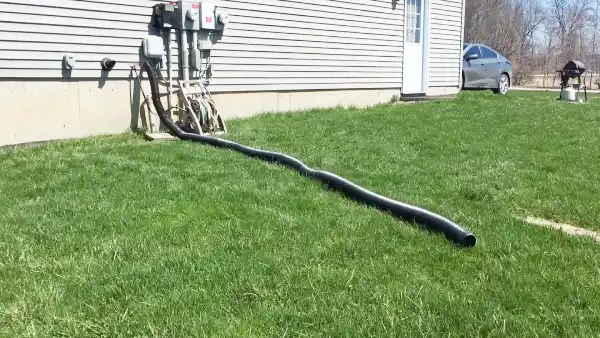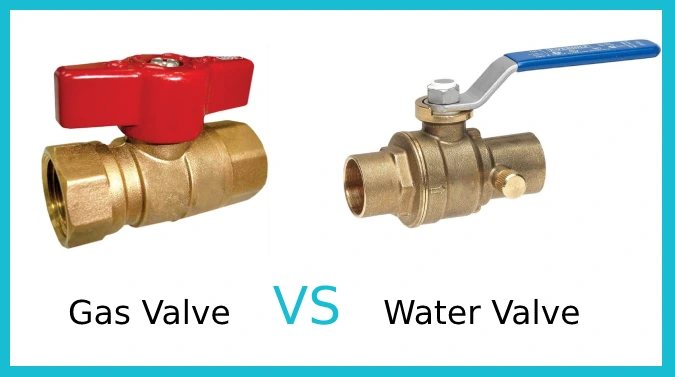Last Updated on April 30, 2023
Are you looking to replace or upgrade the discharge hose for your sump pump? If so, you’ll want to ensure you choose the suitable material. That’s why we will compare a sump pump flexible hose vs PVC.
The most flexible sump pump hoses are polyurethane, Nomex and Hypalon, while PVC is polyvinyl chloride, a rigid/hard plastic. Flexible hoses provide greater flexibility during installation, while PVC is more durable and corrosion-resistant.
Both materials have different temperature ranges, pressure ratings, flow rates, costs, and ease of maintenance that should also be considered before selecting one over the other. Let’s distinguish the two sump pump discharge hose options in more detail.
Sump Pump Flexible Hose Vs PVC: Differences

When connecting the sump pump to the discharge pipe, there are mainly two options: a flexible hose or PVC piping. So what’s the difference between them? Here are some key points of comparison regarding a sump pump flexible hose and PVC piping.
01: Material
As mentioned earlier, a sump pump flexible hose is made of polyurethane, Nomex and Hypalon. While PVC pipe is rigid/hard plastic (polyvinyl chloride).
This difference in material between these two products makes the flexible hose more suitable for installations that require maneuverability or tight spaces. The rubber material also provides additional durability and strength, making it less prone to cracking or breaking than PVC.
02: Flexibility
Flexibility is one of the main advantages of using a sump pump flexible hose over PVC. The rubber material allows the hose to bend and twist into different shapes, making it easier to install in tight spaces where straight runs are difficult or impossible with a rigid pipe.
In contrast, PVC pipes cannot be bent, so they must be cut and fitted together precisely to create an effective water flow system.
03: Durability
The durable rubber of the sump pump flexible hose makes it less likely to crack over time than PVC pipes. This is due to its flexibility which allows it to absorb shocks and vibrations instead of transferring them through the walls of the pipe like a rigid material would do.
Also, the rubber polyurethane material provides additional strength and resilience against extreme weather conditions such as extreme temperatures, UV exposure, and high-pressure environments.
04: Installation
Flexible hoses are much easier to install than PVC pipes because of their flexibility and lack of need for any special tools or fittings. Installation times can be significantly reduced compared to PVC pipes, which require precise cutting and fitting for every section of pipe to work properly.
Furthermore, since no special tools are required for installing a sump pump flexible hose, this reduces overall costs associated with installation and time savings during setup time.
05: Maintenance
Flexible hoses are also much easier to maintain than PVC pipes due to their removal-friendly design.
Suppose there is an issue with one part of the system, such as a crack or blockage. In that case, it can easily be accessed by simply removing a section of the hose to replace it quickly without needing any special tools or fittings, as you would have with a rigid pipe system.
Therefore, this makes maintenance much simpler and quicker than with traditional PVC piping systems, which require dismantling piping sections to access affected areas for repairs or replacements.
06: Resistance to Corrosion
PVC is more corrosion-resistant than flexible hoses, as it is made of plastic that does not rust or corrode over time. PVC can be used in areas with high acidity, alkalinity, and saltwater levels for sump pump application because it does not react to the environment like metal pipes.
This makes it an ideal choice for outdoor applications where the environment could cause corrosion in a traditional flexible hose. Also, PVC is not prone to cracking from changing temperatures like other materials are.
07: Flow Rate
PVC pipes typically have a larger diameter than flexible hoses, allowing for a higher liquid or gas transport flow rate. This is beneficial for applications such as sump pumps that require large amounts of water to be moved quickly and efficiently.
The increased diameter also enables greater pressure ratings when needed, making it an ideal choice for industrial applications where high-pressure ratings are needed.
08: Pressure Rating
PVC pipes have a higher pressure rating than flexible hoses, affecting their suitability for certain applications. It is crucial to consider the nature of the substance being transported and its required pressure rating before making any decisions about piping material.
With PVC having higher rated pressures than sump pump flexible hoses, it is better suited for more demanding industrial applications requiring higher pressures and heavier loads, such as water supply lines and irrigation systems.
09: Temperature Range
For outdoor applications such as those in desert areas or near ocean coastlines, sump pump PVC pipes are better suited than flexible hoses because they can withstand a wider temperature range.
PVC has excellent resistance to embrittlement and cracking from rapid temperature changes, which is especially important if the application requires long-term operation in these conditions.
10: Cost
Flexible hoses are typically more expensive than PVC pipes due to their added flexibility and durability compared to rigid pipe materials like PVC or copper tubing.
With this added cost comes added value. They can bend around corners, simplifying installation processes while also providing shock absorption during vibration-prone operations such as pumping oil through pipelines and drilling rigs at sea.
The flexible hose for sump pumps also generally has longer lifespans due to their superior resistance against abrasion, chemical exposure, kinking/crushing/impacts, etc., which makes them ideal choices despite their higher upfront cost.
But depending on the application, they may be less economical than rigid pipe materials like PVC since they will need replacing much sooner due to wear and tear over time. In contrast, rigid pipe systems usually last much longer with proper maintenance.
Does a flexible hose reduce sump pump pressure?

Flexible hoses are popular when installing a sump pump, but they can reduce the overall water pressure compared to hard-pipe-like PVC connections. This is due to the inner diameter of the hose, which is usually smaller than that of rigid pipes.
As a result, there will be less water pressure and velocity as it passes through the hose. Also, if the flexible hose is too long or has too many bends or turns, then this will further reduce the water flow and pressure.
Regarding performance, though, flexible hoses work great but have a slightly reduced flow capacity. Therefore, if the size of your project works for you, then it’s worth considering using them instead of rigid pipes.
What is the difference between rigid pipe and flexible hose for sump pumps?
Rigid pipes are typically made of PVC or other hard materials, such as metal or fiberglass. They are usually used to connect the sump pump to the discharge pipe and to run the pipe outside the building to discharge water away from home.
Comparatively, flexible hoses are made of more pliable materials like rubber or polyurethane. They offer greater flexibility as they can bend and flex easily. This makes them ideal for connecting different discharge pipe or sump pump sections to the rigid piping system.
Furthermore, some types of the flexible hose can provide additional protection against corrosion due to their material composition.
What type of pipe should you choose for your sump pump discharge hose?

PVC pipes are the most common choice for sump pump discharge hoses for most residential and commercial applications. They are lightweight, durable, and easy to install, making them ideal for these applications.
You can get PVC pipes in different sizes to fit any job, and specialized fittings make it easy to connect pipes.
The flexible hose also has its advantages. For example, when running a long line of pipe or needing to make tight turns. They also protect against vibration and shocks, essential in high-pressure and heavy-load industrial applications.
When choosing the right pipe for your situation, you must always consider local building codes and other factors such as distance from the discharge point and size requirements.
For your convenience, we have already reviewed some of the best sump pump hoses for residential and commercial applications, so click here to read the full article.
What is the right sump pump discharge hose for your needs?
It’s important to make sure that whatever choice you make will best suit your needs, regardless of whether you choose flexible hose or PVC piping.
The hose’s material and flexibility must be considered as its durability, installation process requirements, maintenance demands, resistance to corrosion and other features such as flow rate, pressure rating & temperature range.
Also, the cost is always an essential factor that should not be overlooked. Hopefully, this blog post has given you enough information so that you can make an educated decision on which type of pipe will work best for your specific project.



